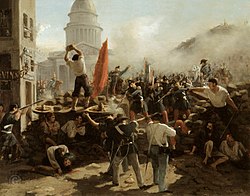Anarcho-communism
Anarcho-communism, also known as anarchist communism, is the belief that hierarchies, money, and social classes should not exist, and that the means of production should be held in common by society.[1][2] Anarcho-communists support direct democracy and a network of voluntary associations, workers' councils, decentralized economic planning and a gift economy in which everyone will be free to satisfy their needs.
Some well-known anarcho-communist writers are Peter Kropotkin, Ricardo Flores Magón and Nestor Makhno. Anarcho-communism is opposed to the more authoritarian forms of communism advocated by Leninists and Maoists. These groups have violently clashed in Russia, Korea and Spain over their beliefs. Some examples of anarcho-communism in practice include the Makhnovshchina, Shinmin Autonomous Region, and the Revolutionary Spain.
Anarcho-communism Media
Painting of the June Days uprising of 1848, which Joseph Déjacque considered to be a social revolution by the proletariat
Mikhail Bakunin led the anti-authoritarian faction within the International Workingmen's Association.
James Guillaume's work set the foundation for the development of communism from collectivism.
Carlo Cafiero led the break from collectivist anarchism with the first programme for anarchist communism.
CNT-FAI Anarchists during the Spanish Revolution of 1936
An anti-fascist poster from the libertarian socialist factions of Madrid, reading "The surveillance of the city must be ensured by the Antifascist Popular Guard" as a warning against Nationalist terrorism
Alexander Berkman advocated for profit to be replaced with communities of common property, where all group members shared possessions
References
- ↑ Mayne, Alan James (1999). From Politics Past to Politics Future: An Integrated Analysis of Current and Emergent Paradigms. Greenwood Publishing Group. p. 316. ISBN 978-0-275-96151-0.
- ↑ Know-it-alls, For (2008). Anarchism for Know-It-Alls. Filiquarian Publishing, LLC. ISBN 978-1-59986-218-7.
sedam







